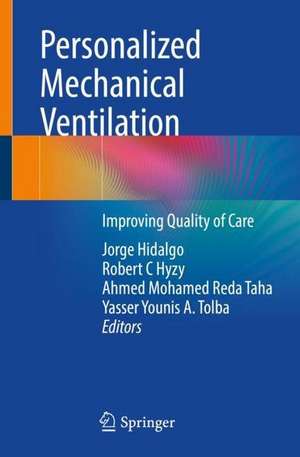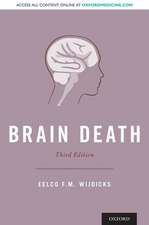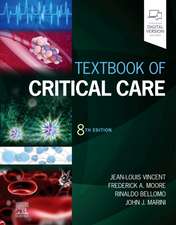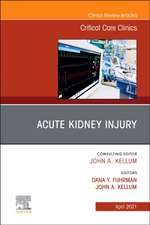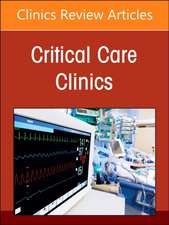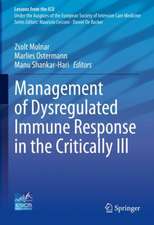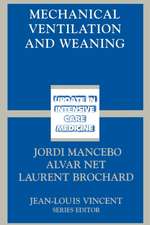Personalized Mechanical Ventilation : Improving Quality of Care
Editat de Jorge Hidalgo, Robert C Hyzy, Ahmed Mohamed Reda Taha, Yasser Younis A. Tolbaen Limba Engleză Paperback – 2 dec 2022
This book is problem-oriented with evidence-based discussions of the daily encountered scenarios in the ICU for mechanically ventilated patients, dealing with the pathology, monitoring and troubleshooting facing intensivists daily. These scenarios are managed utilizing a goal-directed approach and algorithms to achieve these goals. All chapters contain an explanation of a different solution illustrating the respiratory mechanics, physiology and pathology involved in such a scenario. Each chapter also closes with a take-home message to summarize the content. In addition to describing the ventilation of different patient categories, this text also features ventilation cases specific to COVID-19 including airway management in the enhanced air born isolated patient, pulmonary embolism, different states of shock and differential lung ventilation. There is also a specific chapter on monitoring mechanical ventilation with point of care ultrasound, which is an available modality in most ICUs. Another unique chapter describes how to connect more than one patient to one ventilator in case of a shortage of machines.
Written by experts in the field, Personalized Mechanical Ventilation is a timely and valuable resource for critical care physicians, nurses and respiratory therapists on the front lines of both COVID-19 and day-to-day care of mechanically ventilated patients in the ICU.
Preț: 702.04 lei
Preț vechi: 738.99 lei
-5% Nou
Puncte Express: 1053
Preț estimativ în valută:
134.33€ • 140.63$ • 111.15£
134.33€ • 140.63$ • 111.15£
Carte tipărită la comandă
Livrare economică 01-07 aprilie
Preluare comenzi: 021 569.72.76
Specificații
ISBN-13: 9783031141379
ISBN-10: 3031141377
Ilustrații: XII, 378 p. 87 illus., 82 illus. in color.
Dimensiuni: 155 x 235 mm
Greutate: 0 kg
Ediția:1st ed. 2022
Editura: Springer International Publishing
Colecția Springer
Locul publicării:Cham, Switzerland
ISBN-10: 3031141377
Ilustrații: XII, 378 p. 87 illus., 82 illus. in color.
Dimensiuni: 155 x 235 mm
Greutate: 0 kg
Ediția:1st ed. 2022
Editura: Springer International Publishing
Colecția Springer
Locul publicării:Cham, Switzerland
Cuprins
1. Respiratory Physiology and mechanics at the bedside
a. Equation of motion
b. Expiratory time constant
c. Dead space/Dead space fraction
d. Lung Compliance
e. Volumetric capnography
f. Mechanical index of respiratory drive P0.1
g. Driving pressure
h. Measuring patient and ventilator work of breathing 2. Principals of Mechanical Ventilation.
a. Less is more in Mechanical Ventilation
b. Personalized mechanical ventilation tailored to lung morphology
3. Understanding Circuit, Filters and Humidification
4. Airway management during Mechanical Ventilation – COVID 19 a. Tracheostomy in COVID-19
5. Non-invasive ventilation, AVAPS and high-flow nasal Cannula
6. Modes of Mechanical Ventilation
a. Pressure Support Ventilation
b. Assist control modes
a. SIMV and assist modes
b. Airway Pressure Release Ventilation
c. Proportional assist ventilation
d. Adaptive support Ventilation
e. Volume Support ventilation
f. Neurally Adjusted Ventilatory Assist
g. High frequency ventilation
i. High Frequency Oscillatory Ventilation
ii. High Frequency jet Ventilation
iii. High frequency percussive ventilation
iv. High frequency pressure ventilation
7. Acute respiratory failure
8. Mechanical Ventilation in trauma patient
9. Mechanical ventilation in Obese patient
10. Postoperative Mechanical ventilation (fast track)
11. Guidelines to set the ventilator for (COVID-19)
12. Prone position during Mechanical Ventilation
13. Using one ventilator for multiple patients 14. Ventilator associated pneumonia
15. Mechanical ventilation during pregnancy
16. The Art of Weaning and Extubation
17. Mechanical ventilation in shock state a. Different states of shock
b. Ventilation strategy in suspected pulmonary embolism
18. Sedation and neuromuscular blockade
19. Respiratory monitoring Clinical and technical consideration
20. Role of Point of Care Ultrasound during Mechanical Ventilation
21. Acute respiratory distress and ARDS like syndromes
a. Dysregulated Pulmonary Perfusion – COVID 19
22. Patient-ventilator dyssynchrony
23. Unilateral lung disease and differential lung ventilation
24. Obstructive airways disease
25. Mechanical ventilation during ECMO (VV/VA) 26. Mechanical ventilation in Neurocritical care patient
27. Common Troubleshooting in daily practice
a. Equation of motion
b. Expiratory time constant
c. Dead space/Dead space fraction
d. Lung Compliance
e. Volumetric capnography
f. Mechanical index of respiratory drive P0.1
g. Driving pressure
h. Measuring patient and ventilator work of breathing 2. Principals of Mechanical Ventilation.
a. Less is more in Mechanical Ventilation
b. Personalized mechanical ventilation tailored to lung morphology
3. Understanding Circuit, Filters and Humidification
4. Airway management during Mechanical Ventilation – COVID 19 a. Tracheostomy in COVID-19
5. Non-invasive ventilation, AVAPS and high-flow nasal Cannula
6. Modes of Mechanical Ventilation
a. Pressure Support Ventilation
b. Assist control modes
a. SIMV and assist modes
b. Airway Pressure Release Ventilation
c. Proportional assist ventilation
d. Adaptive support Ventilation
e. Volume Support ventilation
f. Neurally Adjusted Ventilatory Assist
g. High frequency ventilation
i. High Frequency Oscillatory Ventilation
ii. High Frequency jet Ventilation
iii. High frequency percussive ventilation
iv. High frequency pressure ventilation
7. Acute respiratory failure
8. Mechanical Ventilation in trauma patient
9. Mechanical ventilation in Obese patient
10. Postoperative Mechanical ventilation (fast track)
11. Guidelines to set the ventilator for (COVID-19)
12. Prone position during Mechanical Ventilation
13. Using one ventilator for multiple patients 14. Ventilator associated pneumonia
15. Mechanical ventilation during pregnancy
16. The Art of Weaning and Extubation
17. Mechanical ventilation in shock state a. Different states of shock
b. Ventilation strategy in suspected pulmonary embolism
18. Sedation and neuromuscular blockade
19. Respiratory monitoring Clinical and technical consideration
20. Role of Point of Care Ultrasound during Mechanical Ventilation
21. Acute respiratory distress and ARDS like syndromes
a. Dysregulated Pulmonary Perfusion – COVID 19
22. Patient-ventilator dyssynchrony
23. Unilateral lung disease and differential lung ventilation
24. Obstructive airways disease
25. Mechanical ventilation during ECMO (VV/VA) 26. Mechanical ventilation in Neurocritical care patient
27. Common Troubleshooting in daily practice
Notă biografică
Dr. Jorge Hidalgo is a Critical Care professor and the Head of Critical Care and COVID-19 Unit at Belize Healthcare Partner Limited Belize, Central America. Dr Hidalgo is also the President-Elect of the World Federation of Societies of Critical Care and Intensive Care Medicine. Dr. Hidalgo was awarded the highest recognition the American College of Physicians offers his members in 2012: "Master of the American College of Physicians." For the last decade, he has been the Director of the prestigious ACP Review Course hosted by the Paraguay Society of Internal Medicine. Due to his outstanding contribution to the Society of Critical Care Medicine, He has received the Presidential Citation Award for the last ten consecutive years. Most recently, He also got the Global Safar Award, and in 2016 the American College of Critical Care awarded him the Master of the American College of Critical Care. Dr. Hidalgo became the First Latin American Intensivist to get this Award. He is a fellow of the American College of Chest Physicians and author of several chapters and Books on Critical Care Medicine, the two most recent publications with springer: Critical Care Administration and highly Infectious disease in Critical Care. He is the Editor of the FCCS Tropical, and he actively participates in the reviewing of the MCCRC, FCCS, FCCS Obstetrics, and FCCS surgical for the society of Critica Care Medicine (SCCM). Dr. Hidalgo, until 2016 was a member Surviving Sepsis Campaign. He is a regular international speaker.
Dr. Robert C. Hyzy is a Professor of Medicine in the Division of Pulmonary and Critical Care, at the University of Michigan in Ann Arbor. He is Medical Director of the Critical Care Medicine Unit at the University of Michigan Hospital and Co-Chair of the University of Michigan Hospital Critical Care Committee. Dr. Hyzy’s research interests are in the area of critical care medicine, including ICU quality improvement, ARDS, and ventilator associated pneumonia. He is the Project Director and Co-Principal Investigator at the University of Michigan for the NHLBI Clinical Trials Network for the Prevention and Early Treatment of Acute Lung Injury (PETAL). Previously he served as the PI of the Clinical Core for the University of Michigan NIH SCCOR in Acute Lung Injury. He has lectured nationally and internationally, contributes 14 topics on mechanical ventilation to the online site UpToDate and is the author of over 130 peer review articles. Dr. Hyzy has edited a volume of Critical Care Clinics entitled “Enhancing the Quality of Care in the ICU” and is the Co-Editor of the Critical Care textbook, “Evidence-Based Critical Care: A Case Study Approach,” whose second edition was published in 2020 by Springer. Dr. Hyzy has been active in the Michigan Health and Hospital Association Keystone ICU project since its inception in 2003. He is a former Chair of the Board of Directors of the MHA Keystone Center. Dr. Hyzy is member of the American Thoracic Membership Committee and is a member and former Chair of the ATS Quality Improvement and Implementation Committee.
Dr. Ahmed Taha MD, M.Sc., MRCP (UK), FRCP(London) (Edinburgh), FCCP, EDIC, FCCM
Dr. Taha is an Intensivist in the Cardiac ICU at the Institute of Critical Care Medicine; Cleveland Clinic Abu Dhabi. Graduated from Ain Shams University and received a Master’s Degree in Cardiology and second Masters Degree in Intensive Care Science from Ain Shams University. He was awarded a Diploma by the Royal Collage of Physician of the United Kingdom (MRCP UK) and was nominated fellowship of the American College Of Chest Physician (FCCP) in 2007. He also received the European Diploma of Intensive Care Medicine (EDIC) from Brussels, Belgium in 2008. He was awarded fellowship by the Royal Collage of Physician of Edinburgh and London (FRCP) in 2013. He is currently a distinguished educator, Course Director and Committee member at the Society of Critical Care Medicine (SCCM) for the Fundamental Critical Care Support Course (FCCS) and the Paediatric Fundamental Critical Care Support Course (PFCCS) and recently the (FCCS Obstetrics), currently a Fellow of the American collage of Critical care Medicine (FCCM). He is also a director of critical care Ultrasound Courses (SCCM), MCCRC - SCCM and BASIC collaboration Intensive Care Courses that conducted across multiple countries in the middle east and North Africa. He conducted researches in critical care ultrasound, congenital heart diseases, surgical airway, mechanical ventilation, hemodynamic, ICU logistics and Simulation based medical education.
Selected as an ambassador for neurocritical care society and helped in stabilising Emergency neurology life support in multiple countries in middle east.
Dr. Taha served as an author in critical care chapters (Scientific American Critical Care, evidence-based web clinical resource UpToDate, Springer, SCCM publications.) . He is also a member of numerous committees and international societies and chair in acute cardiac care working group, he shared as a chairman, speaker and faculty in multiple national and international meetings and conferences.
Dr. Yasser Younis A Tolba PhD, FCAI, FRCA, EDIC, EDAIC, FFICM, FCCP, FIPP
Associate Professor and Consultant in Critical Care Medicine and Anaesthesiology,King Faisal Specialist Hospital & Research Centre and Alfaisal University, Riyadh, KSA.Winner of James Cook Medal of Honour, UK, Previous Posts included Consultant in Intensive Care Medicine and Anaesthesiology, Heart of England NHS Foundation Trust (HEFT), University of Birmingham Hospitals, UK, Adjunct Assistant Professor, Weill Cornell Medicine (Q), New York, USA, Senior Lecturer, Cairo University, Egypt.
Book Contributor, researcher, International speaker and Examiner in Critical Care Medicine
Research Adviser for Medical Trainees, Saudi Commission for Health Specialties, Examiner, Fellowship in Intensive Care Medicine, Saudi Commission for Health Care Specialities, KSA, and EDIC examiner; the European Society of Intensive Care Medicine.Faculty Tutor, the Faculty of Intensive Care Medicine, UK, Instructor, Critical Care Hepatology Course, Neuro Critical Care Society, USA, Primary trauma foundation.Course Director, Mechanical Ventilation, Critical Care Nephrology ; beyond BASIC & BASIC Courses, Endorsed by European Society of Intensive Care Medicine, Instructor, CCrISP, FCCS, MCCRC, FDM.
Dr. Robert C. Hyzy is a Professor of Medicine in the Division of Pulmonary and Critical Care, at the University of Michigan in Ann Arbor. He is Medical Director of the Critical Care Medicine Unit at the University of Michigan Hospital and Co-Chair of the University of Michigan Hospital Critical Care Committee. Dr. Hyzy’s research interests are in the area of critical care medicine, including ICU quality improvement, ARDS, and ventilator associated pneumonia. He is the Project Director and Co-Principal Investigator at the University of Michigan for the NHLBI Clinical Trials Network for the Prevention and Early Treatment of Acute Lung Injury (PETAL). Previously he served as the PI of the Clinical Core for the University of Michigan NIH SCCOR in Acute Lung Injury. He has lectured nationally and internationally, contributes 14 topics on mechanical ventilation to the online site UpToDate and is the author of over 130 peer review articles. Dr. Hyzy has edited a volume of Critical Care Clinics entitled “Enhancing the Quality of Care in the ICU” and is the Co-Editor of the Critical Care textbook, “Evidence-Based Critical Care: A Case Study Approach,” whose second edition was published in 2020 by Springer. Dr. Hyzy has been active in the Michigan Health and Hospital Association Keystone ICU project since its inception in 2003. He is a former Chair of the Board of Directors of the MHA Keystone Center. Dr. Hyzy is member of the American Thoracic Membership Committee and is a member and former Chair of the ATS Quality Improvement and Implementation Committee.
Dr. Ahmed Taha MD, M.Sc., MRCP (UK), FRCP(London) (Edinburgh), FCCP, EDIC, FCCM
Dr. Taha is an Intensivist in the Cardiac ICU at the Institute of Critical Care Medicine; Cleveland Clinic Abu Dhabi. Graduated from Ain Shams University and received a Master’s Degree in Cardiology and second Masters Degree in Intensive Care Science from Ain Shams University. He was awarded a Diploma by the Royal Collage of Physician of the United Kingdom (MRCP UK) and was nominated fellowship of the American College Of Chest Physician (FCCP) in 2007. He also received the European Diploma of Intensive Care Medicine (EDIC) from Brussels, Belgium in 2008. He was awarded fellowship by the Royal Collage of Physician of Edinburgh and London (FRCP) in 2013. He is currently a distinguished educator, Course Director and Committee member at the Society of Critical Care Medicine (SCCM) for the Fundamental Critical Care Support Course (FCCS) and the Paediatric Fundamental Critical Care Support Course (PFCCS) and recently the (FCCS Obstetrics), currently a Fellow of the American collage of Critical care Medicine (FCCM). He is also a director of critical care Ultrasound Courses (SCCM), MCCRC - SCCM and BASIC collaboration Intensive Care Courses that conducted across multiple countries in the middle east and North Africa. He conducted researches in critical care ultrasound, congenital heart diseases, surgical airway, mechanical ventilation, hemodynamic, ICU logistics and Simulation based medical education.
Selected as an ambassador for neurocritical care society and helped in stabilising Emergency neurology life support in multiple countries in middle east.
Dr. Taha served as an author in critical care chapters (Scientific American Critical Care, evidence-based web clinical resource UpToDate, Springer, SCCM publications.) . He is also a member of numerous committees and international societies and chair in acute cardiac care working group, he shared as a chairman, speaker and faculty in multiple national and international meetings and conferences.
Dr. Yasser Younis A Tolba PhD, FCAI, FRCA, EDIC, EDAIC, FFICM, FCCP, FIPP
Associate Professor and Consultant in Critical Care Medicine and Anaesthesiology,King Faisal Specialist Hospital & Research Centre and Alfaisal University, Riyadh, KSA.Winner of James Cook Medal of Honour, UK, Previous Posts included Consultant in Intensive Care Medicine and Anaesthesiology, Heart of England NHS Foundation Trust (HEFT), University of Birmingham Hospitals, UK, Adjunct Assistant Professor, Weill Cornell Medicine (Q), New York, USA, Senior Lecturer, Cairo University, Egypt.
Book Contributor, researcher, International speaker and Examiner in Critical Care Medicine
Research Adviser for Medical Trainees, Saudi Commission for Health Specialties, Examiner, Fellowship in Intensive Care Medicine, Saudi Commission for Health Care Specialities, KSA, and EDIC examiner; the European Society of Intensive Care Medicine.Faculty Tutor, the Faculty of Intensive Care Medicine, UK, Instructor, Critical Care Hepatology Course, Neuro Critical Care Society, USA, Primary trauma foundation.Course Director, Mechanical Ventilation, Critical Care Nephrology ; beyond BASIC & BASIC Courses, Endorsed by European Society of Intensive Care Medicine, Instructor, CCrISP, FCCS, MCCRC, FDM.
Textul de pe ultima copertă
In dealing with the unprecedented COVID-19 pandemic, there are an increased number of patients requiring personalized management as the disease pathology varies. With variable lung compliance and airway resistance as well as the severity of the disease, one size will not fit all patients.
This book is problem-oriented with evidence-based discussions of the daily encountered scenarios in the ICU for mechanically ventilated patients, dealing with the pathology, monitoring and troubleshooting facing intensivists daily. These scenarios are managed utilizing a goal-directed approach and algorithms to achieve these goals. All chapters contain an explanation of a different solution illustrating the respiratory mechanics, physiology and pathology involved in such a scenario. Each chapter also closes with a take-home message to summarize the content. In addition to describing the ventilation of different patient categories, this text also features ventilation cases specific to COVID-19 including airway management in the enhanced air born isolated patient, pulmonary embolism, different states of shock and differential lung ventilation. There is also a specific chapter on monitoring mechanical ventilation with point of care ultrasound, which is an available modality in most ICUs. Another unique chapter describes how to connect more than one patient to one ventilator in case of a shortage of machines.
Written by experts in the field, Personalized Mechanical Ventilation is a timely and valuable resource for critical care physicians, nurses and respiratory therapists on the front lines of both COVID-19 and day-to-day care of mechanically ventilated patients in the ICU.
This book is problem-oriented with evidence-based discussions of the daily encountered scenarios in the ICU for mechanically ventilated patients, dealing with the pathology, monitoring and troubleshooting facing intensivists daily. These scenarios are managed utilizing a goal-directed approach and algorithms to achieve these goals. All chapters contain an explanation of a different solution illustrating the respiratory mechanics, physiology and pathology involved in such a scenario. Each chapter also closes with a take-home message to summarize the content. In addition to describing the ventilation of different patient categories, this text also features ventilation cases specific to COVID-19 including airway management in the enhanced air born isolated patient, pulmonary embolism, different states of shock and differential lung ventilation. There is also a specific chapter on monitoring mechanical ventilation with point of care ultrasound, which is an available modality in most ICUs. Another unique chapter describes how to connect more than one patient to one ventilator in case of a shortage of machines.
Written by experts in the field, Personalized Mechanical Ventilation is a timely and valuable resource for critical care physicians, nurses and respiratory therapists on the front lines of both COVID-19 and day-to-day care of mechanically ventilated patients in the ICU.
Caracteristici
Utilizes a problem-oriented approach with explanation guided by the physiology and pathology of different scenarios
Highlights new therapeutic strategies of ventilation for management of COVID-19 with different clinical presentations
Includes a take home message at the end of each chapter to summarize the chapter
Highlights new therapeutic strategies of ventilation for management of COVID-19 with different clinical presentations
Includes a take home message at the end of each chapter to summarize the chapter
